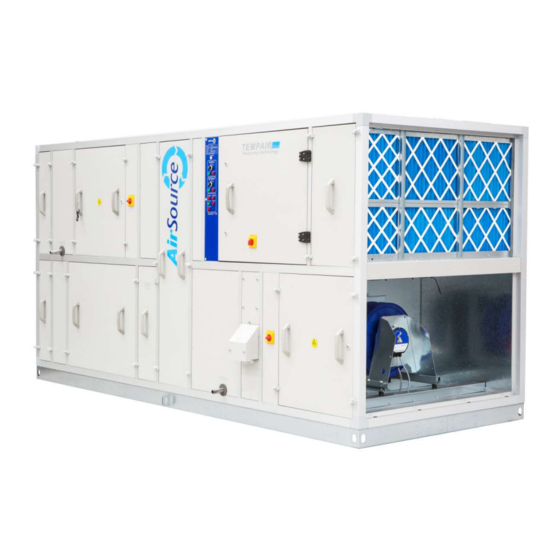AirSource TempAir Instrukcja instalacji, obsługi i konserwacji - Strona 19
Przeglądaj online lub pobierz pdf Instrukcja instalacji, obsługi i konserwacji dla Centrale wentylacyjne AirSource TempAir. AirSource TempAir 20 stron. Air handling units, airsource heatpumps

Disassembly Guide
Doors/Panels: All exterior panels and doors are constructed using plastisol and/or
galvanised steel as an exterior surface, containing fibre glass insulation within, along
with a polymerised acoustic barrier (if applicable) which must both be removed from
the steel casing before recycling. Removal of the rivets for each door/panel can be
performed by drilling. Once the two shells of the panel have been separated, other
plastic components can be removed, such as door handles and locks, for separate
recycling.
Fans: Once all panels and doors have been disassembled and sorted for recycling,
large components can be removed, such as fans and thermal wheels/recuperators.
To remove the fans, remove all fixings from where the fan flange meets the fan plate,
then loosen and remove the nuts at the base of the fan. Depending on the weight
and size of the fan, some specialised lifting equipment may be required to lift out the
fan from inside the unit using the lifting hooks provided at the crest of the motor.
Thermal wheels/Recuperators: To remove a thermal wheel or recuperator, remove
all fixings then slide out onto a suitable lifting platform, using loading straps attached
to fixing points if necessary to balance. Thermal wheels are predominantly made
from steel with aluminium fins, however the motor and circuit boards contain some
toxic materials and must be disposed of according to local regulations for such
electronic components. There are also some plastic components such as the brush
fibres which may require separation. Recuperators are made from steel with
aluminium fins. Removal may require first removing part of the aluminium frame.
Filters: Filters can be removed by loosening the fixings as per the normal
maintenance process then recycled. Panel filters are comprised of paper cardboard,
synthetic felt polymer and steel wire frame. Bag filters have a steel frame, with felt
polymer comprising the main body of the filter and thus must be additionally
separated into individual components for most recycling centres.
Refrigeration: Refrigeration circuits MUST be isolated and purged by F-GAS
registered professionals and/or a relevant accredited professional in the applicable
country by law. Refrigeration gases are destructive to the natural environment and
serious fines can occur due to inadequate disposal. They must be decanted into a
suitable canister and can either be recycled or taken to a lawful and registered
disposal site. See BS EN 378 for more information regarding British and European
guidelines on refrigerants.
Coils: When removing coils, care needs to be taken that the coils have been isolated
from the main circuit and purged properly by the relevant professionals (for coils
containing refrigerants). Once the inlet and outlet pipes have been disconnected and
drained, remove the fixings holding the coil into place on the access side, then slide
out gently onto specialised lifting equipment. Coil pipes are manufactured from
copper, fixed onto a steel frame containing aluminium fins, and are widely recyclable.
All pipes connecting to the coils are manufactured from copper and can either be cut
out with pipe cutting equipment or removed using a cutting torch (IMPORTANT:
Pipes must be purged thoroughly before removal).
Compressors: Compressors require special handling and disposal due to residual
refrigerant gases which may be present in the system. Contact your local
refrigeration handling facility for more information.
Dampers: Dampers blades are predominantly aluminium with some plastic
components, contained within an aluminium housing which includes some plastic
gears.
18
Installation, Operation & Maintenance Manual
